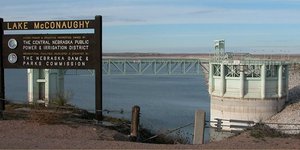![]()

A group of central Nebraska irrigators have launched 2 legal challenges to the planned merger of two public power and irrigation districts.
The boards of the Central Nebraska Public Power and Irrigation District and Dawson Public Power approved merging in October.
Holdrege-based Central operates Kingsley Dam and its hydroelectric plant on Lake McConaughy while serving 900 irrigators via canals on the south side of the Platte River while Lexington-based Dawson is one of the state’s largest rural electric providers.
A group called “Citizens Opposed to the Merger” filed a lawsuit on Friday, then was joined by two couples who are irrigators in Phelps County in filing a formal protest Monday with the Nebraska Power Review Board, which meets a week from tomorrow.
Citizens Opposed chairman Gary Robison of Bertrand says the lawsuit argues the two boards violated public meeting laws when they approved the merger while the protest to the Power Review Board has 4 major objections.
Two of the challenges are that the merger dilutes the power of irrigators by reducing the number of board members from the major irrigation areas of the merged district, and unfairly obligating Central members to pay off Dawson debts.
The others argue that merger fails to reduce duplication or “serve the public convenience and welfare” as required by state law, and that Central’s vote to move forward should be nullified because a board vacancy had not been filled
Backers of merger say it will save millions of dollars in electrical costs and that it makes sense to combine Central, which provides irrigation water and generates power at Lake McConaughy and elsewhere, with Dawson, a major retail provider of electricity.
Robison says the challengers are worried the merged district board might sell off some of its water, hurting irrigators, or stop using money from hydropower production to offset the costs of running Central’s canal system.
A consultant has said $12-million dollars spent on electric purchases to run the two districts could be saved over 7 years if they merge.
